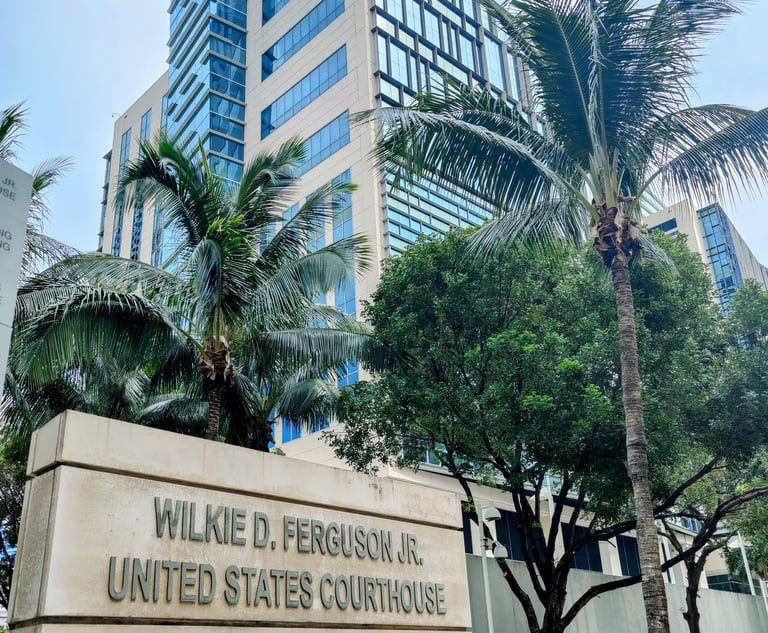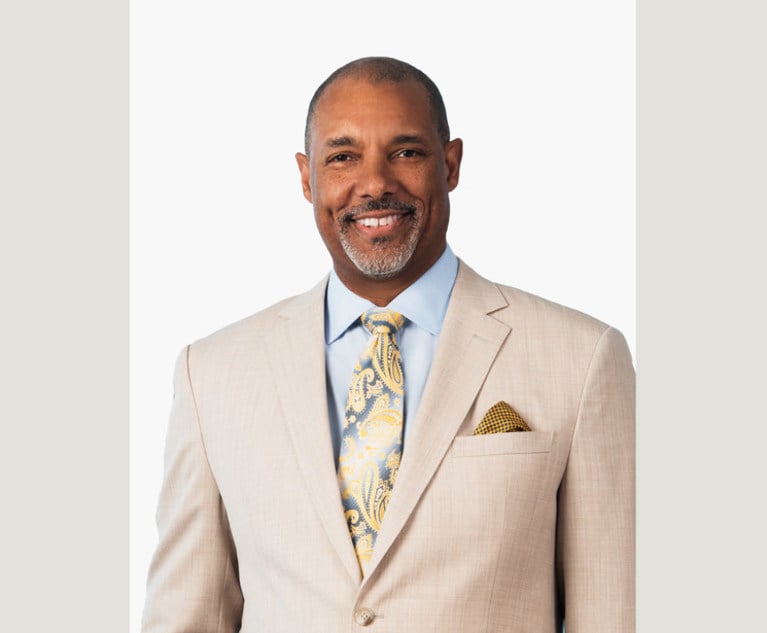Food Fight Led by Public Interest Law Firm Ends Well for Skim Milk-Making Dairy
Justin Pearson and Ari BargilInstitute for Justice Florida Mary Lou Wesselhoeft of Ocheesee Creamery wanted her skim milk to be labeled…
December 11, 2017 at 06:00 AM
2 minute read

Justin Pearson and Ari Bargil
Institute for Justice Florida
Mary Lou Wesselhoeft of Ocheesee Creamery wanted her skim milk to be labeled just that.
Fat-soluble Vitamin A is skimmed off with the lighter fat when cream is removed to make skim milk, and Ocheesee's additive-free commitment meant it wouldn't replace the vitamins.
But the state Department of Agriculture and Consumer Services insisted on a label saying “imitation” or “milk product” because Wesselhoeft didn't replenish the lost vitamins as required by state regulations. Two stop-sale orders were issued in 2012.
The all-natural milk producer in rural Calhoun County“ felt like she was banging her head against the wall,” Justin Pearson, managing attorney of the Institute for Justice Florida office, wrote in a motion. The Miami office is part of a nonprofit libertarian public interest law firm based in Virginia.
State Agriculture Commissioner Adam Putnam was sued in 2014 for rejecting five proposed labels.
U.S. District Judge Robert Hinkle rejected a First Amendment claim of protected commercial speech and issued a summary judgment in favor of the state.
The U.S. Court of Appeals for the Eleventh Circuit reversed him in March, ruling “the Creamery's label does not concern unlawful activity and is not inherently misleading.”
In litigation over fees, the state asked for a reduction, claiming the creamery met with only limited success. Hinkle concluded, “As a practical matter, the plaintiff prevailed completely.”
Florida has agreed to pay $428,855 in legal fees to the pro bono attorneys who beat the state,
Pearson called the decision “the first of a kind in litigation regarding food labels.”
Milk has been a point of contention for the Institute for Justice before. Its defense of an Oregon dairy that produced raw milk fought an advertising ban with state regulators, and the Legislature repealed the ban in 2015.
This content has been archived. It is available through our partners, LexisNexis® and Bloomberg Law.
To view this content, please continue to their sites.
Not a Lexis Subscriber?
Subscribe Now
Not a Bloomberg Law Subscriber?
Subscribe Now
NOT FOR REPRINT
© 2025 ALM Global, LLC, All Rights Reserved. Request academic re-use from www.copyright.com. All other uses, submit a request to [email protected]. For more information visit Asset & Logo Licensing.
You Might Like
View All
'Close Our Borders?' Senate Judiciary Committee Examines Economics, Legal Predicate for Mass Deportation Proposal
3 minute read

'Stab Venequip in the Back': Caterpillar Faces $100M Lawsuit in Miami Federal Court
3 minute read
Another Roundup Trial Kicks Off in Missouri. Monsanto Faces 3 Plaintiffs
4 minute readTrending Stories
- 1'David and Goliath' Dispute Between Software Developers Ends in $24M Settlement
- 2Supreme Court Takes Up the Corporate Transparency Act: Recent Litigation and Potential Next Steps
- 3Brogdon: The Final Nail in Corbin’s Coffin in Premises Cases
- 4What to Know About the New 'Overlapping Directorship' Antitrust Development
- 5'Quiet, Appropriate End:' NY Court of Appeals Formally Removes Erin Gall From Bench
Who Got The Work
Michael G. Bongiorno, Andrew Scott Dulberg and Elizabeth E. Driscoll from Wilmer Cutler Pickering Hale and Dorr have stepped in to represent Symbotic Inc., an A.I.-enabled technology platform that focuses on increasing supply chain efficiency, and other defendants in a pending shareholder derivative lawsuit. The case, filed Oct. 2 in Massachusetts District Court by the Brown Law Firm on behalf of Stephen Austen, accuses certain officers and directors of misleading investors in regard to Symbotic's potential for margin growth by failing to disclose that the company was not equipped to timely deploy its systems or manage expenses through project delays. The case, assigned to U.S. District Judge Nathaniel M. Gorton, is 1:24-cv-12522, Austen v. Cohen et al.
Who Got The Work
Edmund Polubinski and Marie Killmond of Davis Polk & Wardwell have entered appearances for data platform software development company MongoDB and other defendants in a pending shareholder derivative lawsuit. The action, filed Oct. 7 in New York Southern District Court by the Brown Law Firm, accuses the company's directors and/or officers of falsely expressing confidence in the company’s restructuring of its sales incentive plan and downplaying the severity of decreases in its upfront commitments. The case is 1:24-cv-07594, Roy v. Ittycheria et al.
Who Got The Work
Amy O. Bruchs and Kurt F. Ellison of Michael Best & Friedrich have entered appearances for Epic Systems Corp. in a pending employment discrimination lawsuit. The suit was filed Sept. 7 in Wisconsin Western District Court by Levine Eisberner LLC and Siri & Glimstad on behalf of a project manager who claims that he was wrongfully terminated after applying for a religious exemption to the defendant's COVID-19 vaccine mandate. The case, assigned to U.S. Magistrate Judge Anita Marie Boor, is 3:24-cv-00630, Secker, Nathan v. Epic Systems Corporation.
Who Got The Work
David X. Sullivan, Thomas J. Finn and Gregory A. Hall from McCarter & English have entered appearances for Sunrun Installation Services in a pending civil rights lawsuit. The complaint was filed Sept. 4 in Connecticut District Court by attorney Robert M. Berke on behalf of former employee George Edward Steins, who was arrested and charged with employing an unregistered home improvement salesperson. The complaint alleges that had Sunrun informed the Connecticut Department of Consumer Protection that the plaintiff's employment had ended in 2017 and that he no longer held Sunrun's home improvement contractor license, he would not have been hit with charges, which were dismissed in May 2024. The case, assigned to U.S. District Judge Jeffrey A. Meyer, is 3:24-cv-01423, Steins v. Sunrun, Inc. et al.
Who Got The Work
Greenberg Traurig shareholder Joshua L. Raskin has entered an appearance for boohoo.com UK Ltd. in a pending patent infringement lawsuit. The suit, filed Sept. 3 in Texas Eastern District Court by Rozier Hardt McDonough on behalf of Alto Dynamics, asserts five patents related to an online shopping platform. The case, assigned to U.S. District Judge Rodney Gilstrap, is 2:24-cv-00719, Alto Dynamics, LLC v. boohoo.com UK Limited.
Featured Firms
Law Offices of Gary Martin Hays & Associates, P.C.
(470) 294-1674
Law Offices of Mark E. Salomone
(857) 444-6468
Smith & Hassler
(713) 739-1250






